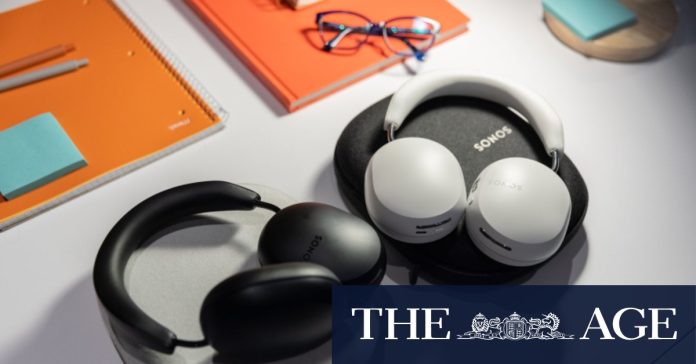[ad_1]
One unique feature is that the Ace works seamlessly with Sonos’ Arc sound bar. This allows users to switch from home theatre sound output to headphones at the touch of a button, meaning you can listen to TVs or movies quietly at night without disturbing the rest of your family.
However, some users have scrutinised Sonos, questioned why the Ace doesn’t use Wi-Fi – like the company’s other products – and therefore doesn’t integrate with the wider Sonos ecosystem. The Ace instead connects to smartphones and other devices via Bluetooth, much like any other pair of Bluetooth headphones.
“There are trade-offs you have to make,” Spence said about that decision. “The number one thing for consumers is that they want it to work out of the box, rather than having to take it home and set it up on your Sonos app, that’s something we learned with our Roam Bluetooth speaker. The other issue was a huge battery-life drop [with Wi-Fi], we want people to be able to use the headphones for a couple of days.
“It’s something we’ll continue to look at. We try not to be too religious on the technology, but instead focus on the customer experience.”
Sonos also received criticism for a recent app redesign, which removed certain features, including sleep timers and the ability to edit playlists, and has reportedly broken accessibility for some visually impaired users.
Spence said customers had been calling for the Sonos app to be more modern and easier to navigate but admitted that the company had missed some bugs in its testing, such as the removal of sleep timers.
“The two things people have been asking for from us have been headphones and ‘Can you make your app easier and quicker to use?’” he said.

Sonos Ace headphones during a media preview in New York, US, on Wednesday, May 15, 2024. Credit: Bloomberg
“People expect us to have an app that operates more like Spotify, or Apple Music or Uber, and there’s been some bumps as we’ve gone through it. There was some stuff we didn’t pick up in testing, but we are working 24/7 to make sure we are addressing any bugs that come up.”
Spence’s hopes for the Ace is that it is not only well received by current customers but also attracts new ones, particularly younger people and females, for a brand that previously has been synonymous with audiophiles, who typically skew to a slightly older and male demographic. “We think this is a real opportunity to broaden our reach,” he said.
“It’s been a real grind in terms of coming off the highs of the pandemic, and the categories we’re in have been very, very competitive. We see our competitors do 30 or 40 per cent discounts pretty regularly, but we feel pretty good about our ability to navigate through these tougher times. And I’m glad we’re now in a large, growing category because I think that will help our revenue a little bit.”
Loading
Sonos’ chief product officer, Maxime Bouvat-Merlin, said there were no limits to what type of audio product the company might tackle next. “We think we have permission to enter any audio category … we want to be the leader in sound experience, and so the sky’s the limit,” he said.
“I think about Sonos as being an experience that you carry with you from the time you wake up in the morning until you go to sleep at night. We would like to be there throughout your day, but not everywhere. We’ll be there in the moments where we can drive the right experience and help create magical transitions from one moment to another,” Bouvat-Merlin said.
Get news and reviews on technology, gadgets and gaming in our Technology newsletter. Sign up to receive it every Friday.
[ad_2]
Source link


